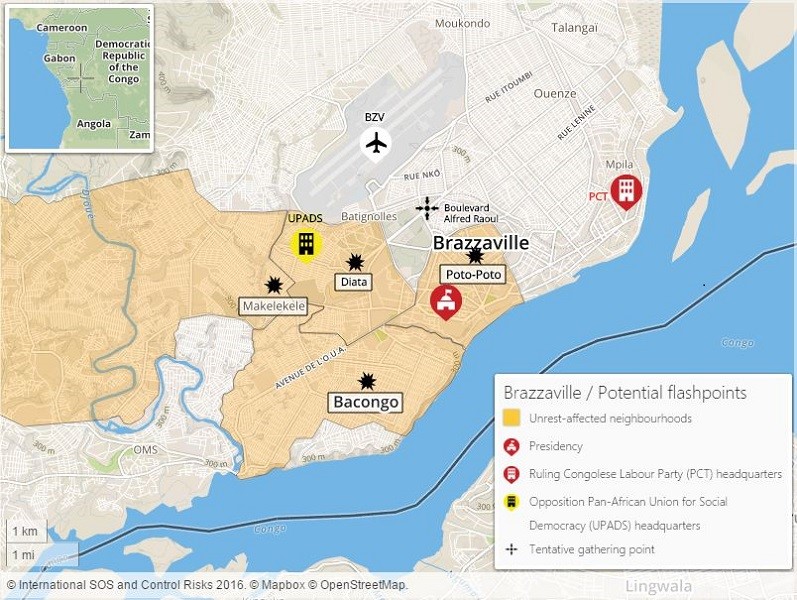23rd March 2016 - Congo
Congo: Continue to minimise movement following 20 March presidential election; opposition to release unofficial results on 23 March
Members in Congo should continue to expect a heightened security force presence and closely follow all election-related developments after the 20 March presidential election. Text messaging (SMS) and mobile internet services remain suspended on 23 March as opposition groups have indicated that they would release their own, unofficial results on the day.
Members in the capital Brazzaville and Pointe-Noire (Pointe-Noire department) should continue to minimise movement after partial preliminary results released on 22 March suggested that incumbent President Denis Sassou Nguesso could be declared the victor. Local reports indicate that many shops and French schools remained closed on the day while a heavy security force presence was visible in southern areas of Brazzaville, known opposition strongholds.
Travel Briefing
Opposition groups have denounced the electoral process and have created their own, parallel election commission to carry out separate checks on the conduct of the poll; as they have rejected the official results released so far, their own tallies can be expected to differ from official results. The limited number of international observers deployed for the polls, partly attributable to the fact that they were called at short notice, increases the likelihood of opposition challenges to the result. Localised unrest and associated disruption are likely should opposition-led demonstrations be held when preliminary results are announced.
Should protests break out, areas of Brazzaville most liable to be affected are known opposition strongholds such as Bacongo, Diata, Makélékélé and Poto-Poto. Flashpoints in Pointe-Noire include the Lumumba roundabout (Rond-Point Lumumba) and theTié-Tié and Voungouta neighbourhoods (see maps below). The police may use tear gas but also live ammunition to disperse protesters; any such disturbances would pose significant incidental risks to bystanders. Members should avoid all protests and leave an area at the first sign of unrest.
Travellers should have alternate means of communication and radios with spare batteries to mitigate the impact of likely power cuts, which are possible due to the current rainy season. Should the security situation rapidly deteriorate, members should ensure they have sufficient water and essential supplies to be ready to stand fast at their accommodation for up to one week.

.jpg)
Background
Proposed constitutional changes – which were approved in the 25 October 2015 referendum and allowed President Denis Sassou Nguesso to run for a third term on 20 March – triggered in a wave of protests. At least five people were killed and dozens of others arrested during related demonstrations in September and October 2015.
Travel Advice Summary
- Members in main urban centres should continue to minimise movement. Keep abreast of key election-related developments due to the potential for disruption and localised unrest. Remain alert to your surroundings and leave an area at the first sign of unrest.
- Members arriving in the country during the election period should expect increased scrutiny upon arrival. Infrequent travellers or travellers with no permanent representation in-country may be denied entry with little or no official justification.
- Maintain stocks of essential supplies at your accommodation; preparations should include stockpiling food, water and back-up power, as well as gas and oil supplies. Ensure that communications devices are fully-charged, regularly tested and have emergency numbers pre-programmed.
- Register with your embassy and all relevant warden networks; ensure that you receive regular updates prior to and during travel.
- Monitor our travel security alerts on Congo for further updates.
